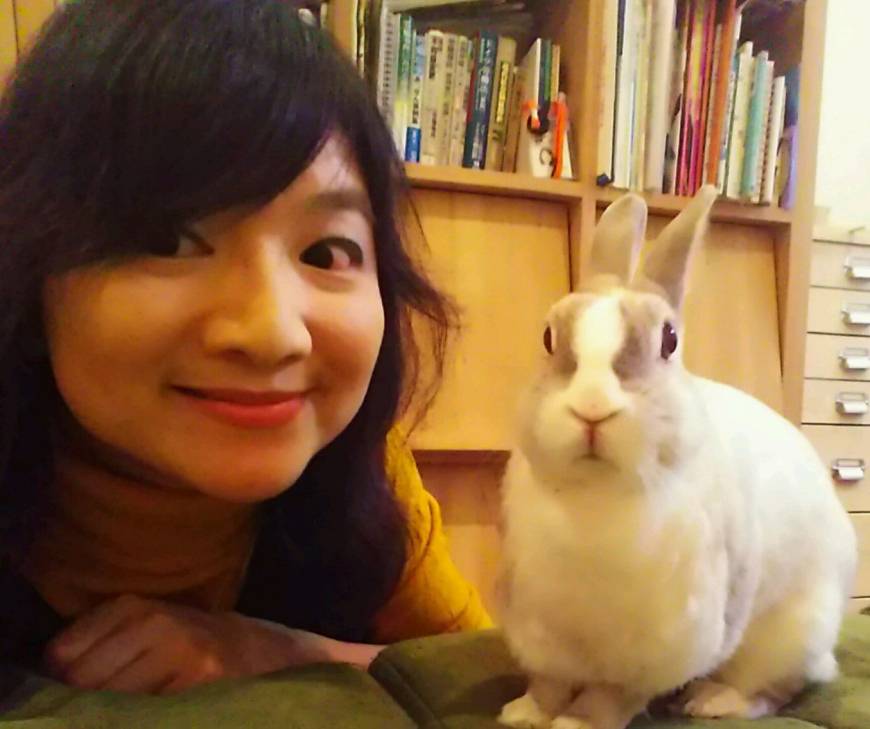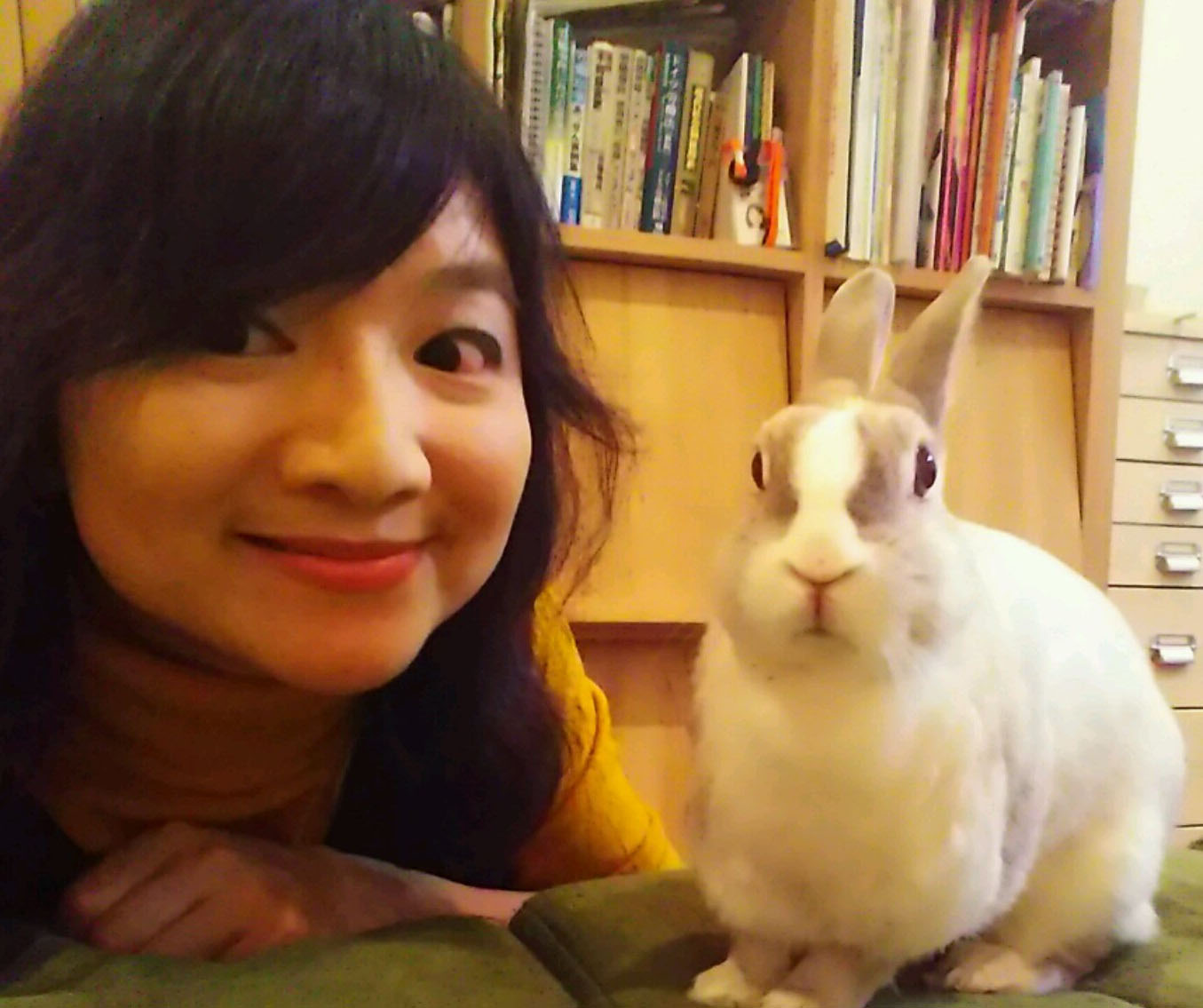This month I will explore compassionate leave — called kibiki kyūka in Japanese — the days you take off after losing a close family member. I chose this topic because I recently suffered a string of painful losses. Please bear with me as I relate to you what has happened to my loved ones over the past couple months.
Do you remember my granny bunny? I told you about her and the need for pet loss leave exactly a year ago in my February 2017 column, “Japanese need to take more leave, starting with when beloved pets pass.” Readers from around the world wrote to me in response to that article, empathizing, expressing warm wishes, like “I wish I could have taken off work after I lost my hamster” and “I feel such sadness when I remember my cat’s death.”
My sweet, dear bunny took her last breath just after midnight on Dec. 1, 2017. She was almost 10 years old when she embarked on her final voyage back to the moon. People see what they want to see in the splotches on the lunar surface that faces us during its synchronous rotation. Some see a crab, others a lion or an old woman, or human hands. But Japanese have for centuries seen the silhouette of a rabbit pounding mochi rice cakes to make them soft.
Three deaths in the ‘family’
Having loved rabbits since childhood, as an adult I found myself surrounded by bunny goods and accessories. But I had never kept a real flesh-and-blood rabbit. So when I saw an appeal from a friend on Facebook for a family to take in 7-year-old Haneko-chan, my heart stirred.
Despite having no common language, this rabbit taught me so much in our two short years together. Each morning, I woke, gave her water and breakfast, cleaned her cage, departed for work, then after work stopped by at the supermarket to fetch radishes for her (she ate the stems and leaves; my husband ate the bulbs). Ordinarily, I loved to meander on convoluted detours on my way home, but with Haneko-chan waiting at home, I no longer tarried but rather hopped home to pet her, feed her, clean up after her and top up her water. These acts became my routine, a part of my daily life. Her pointed TV-antenna ears, goofy face and warm calm took away the stress of work — the myriad mumblings and grumblings I hear at work each day, the slings and arrows of frustration that strike us all at workplaces around the world.
Some six months before her death, we discovered she had a large tumor surrounding her heart. The vet offered little in terms of hope but lots of medicine to be administered twice daily. A swollen pus-oozing sore caused by enlarged molars covered much of the left side of her face, and this required daily disinfecting. She was going blind, and her Olympic jumping skills were slipping. All these ailments required frequent trips to an animal hospital that specialized in rabbits and other “exotic” pets.
No matter how much I prepared myself, I wasn’t prepared. No matter how gradually the process of dying proceeded, each step seemed so sudden. During the last days, my husband and I wept like children over this 1.3-kilogram creature struggling until her last breath to continue living.
Her death and the way she lived changed me — changed the way we live, the way we think in ways that are hard to express. So, when she cried out for the first time in her life (as rabbits are wont to do at the very end), when her voice made that peculiar plaintive meow as she extended her neck to try somehow to suck air into her collapsing lungs, the only thing I could think of to say through my tears was “Arigatō! Arigatō! Arigatō!Thank you for coming to live with us.” Her blind eyes stared at us as her breathing quieted. In, out. In, out.
We washed her body in the sink. These ablutions refreshed our hearts more than they removed the filth matted to her fur.

Then my mother died.
Forty days after Haneko-chan passed, and after three decades battling illness, my 80-year-old mother left us for good. My elder sister found her crumpled over, scalded and comatose in the bath, and her heart stopped 16 hours later. It was as if a wind had come and blown her away. Her favorite slippers, food utensils and glasses lie where they were last set, as if waiting for their mistress’ return.
Her death hasn’t hit me yet, to be honest, and I cannot speak of this with anything approaching objectivity. I have not yet processed the fact that my mother is no longer among the living. A co-worker whose own mother had died once said, “The death of a family member hits you like a body blow but with a time lag.”
On Dec. 12, a fellow union member died (see the obituary “Ryan Smith: Father, husband, communist,” Dec. 24, 2017).
He was the kind who stood up to bullies and reached out to the weak. In the blink of an eye, he was gone.
No right for leave to grieve
How do those who toil all day long, whether in an office, a factory, a school or a shop, manage to cope with the death of loved ones? A disconnect separates our mundane labors from the dignity we demand when death strikes.
A disconnect also separates the daily humiliation we suffer at work from the delight we experience at weddings, births and other joyous occasions, which have their own type of paid leave — keiji kyūka. Add kibiki kyūka and keiji kyūka and you get a word that refers to celebratory or compassionate leave, keichō kyūka.
When my mother died, my university granted me five days kibiki leave. Those days included Jan. 13 and 14, which happen to be the days of the simultaneous National Center Test for University Admissions, or sentā shiken. Full-time university teachers must invigilate these tests at schools around the country. The death of a close family member is apparently one of the few excuses to get you out of this very serious responsibility.
Keichō kyūka is not mandated by labor law. It is up to the discretion of each employer whether to grant these days off and what conditions pertain, including whether the leave is paid and how to define “close family member.” In reality, it would be hard for a company to refuse. In fact, 252 of 256 corporations polled last year have some sort of system, according to the Institute of Labor Administration. The same poll revealed the sober trivium that the average worker takes off 5.6 days after the death of a spouse.
These rosy figures hide a thorny disparity between regular and contingent workers, however. Some 44.9 percent of those working on fixed-term contracts at private firms (at least 20 hours per week) report that they are ineligible for such leave, according to a poll by the Japan Trade Union Confederation (Rengo). Only 30.7 percent of such workers in labor unions cannot take such leave, while 48.6 percent of nonunionized workers are ineligible. This refers to official eligibility. In reality, as previously mentioned, it seems implausible that an employer would say “Don’t go to your father’s funeral.”
Function follows form
In Japan, we say that your form of employment determines your social status. The idea that the corporation is your family (kigyō-ikka) took root during the rapid economic growth of the postwar period. The company president serves as patriarch, the vice president as matriarch, and the employees serve as the parents’ plentiful progeny. The coworker tie is as strong as a blood bond between brothers. But note that only “regular workers” are counted among the corporation’s legitimate children here. The contingent, fixed-term and part-time workers play the illegitimate offspring in this corporate schema.
Father loves his children with a powerful affection inasmuch as and so long as they obey. One manifestation of this powerful love is the system of kibiki kyūka. The message is that the company loves your family as much as you do. The employee/child naturally feels such gratitude and loyalty to their company that they are willing to go that extra mile, and that extra mile again — and maybe two more extra miles.
But what about when children are naughty? What about when they express independent opinions? What if they rebel against Father? The loving palm then flips over to the backhand of rejection. The employee may find themselves fired, harassed or isolated. So corporate employees thrive at the pleasure of the great father; they flounder at his whim.
Perhaps this corporate family mentality, this relic of the Showa Era (1926-89), is finally fading. But although full of flaws, this patriarchal mind-set isn’t the worst thing for workers. What is worse is what they face today, with the percentage of fixed-term, irregular, dispatch and part-time workers having climbed to nearly 40 percent of the total workforce.
Such workers are excluded from the loving corporate embrace. Corporations don’t cheer their weddings. Companies shed no tears when their loved ones die. Yet don’t contingent workers weep when a family member dies? Don’t part-timers mourn the way we all do? Do temp workers love less?
Of course, in reality, insentient corporations do not give a damn about your family, and maybe that is why Japan Inc. has become notorious for working its loyal employees to death. Isn’t it time that we as a society ensure that all our workers have sufficient time to mourn the death of a mother, a friend — or even a silly old bunny?


Comments are closed